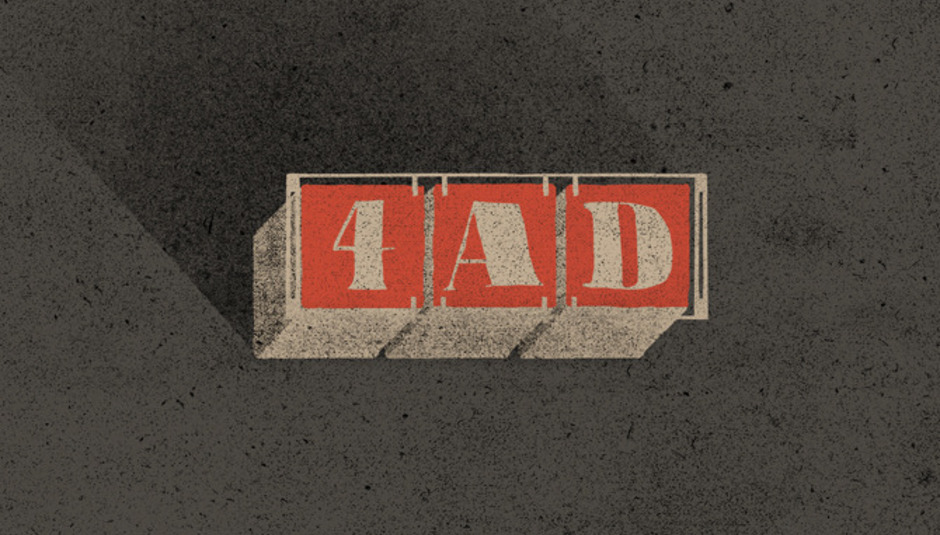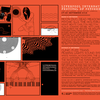Every great label has their benchmark artists, their flagpole albums; their glistening moments in the sun. An enduring label legacy – often based around a few huge hits or well regarded anthems, is usually facilitated by a very small portion of their roster. There’s no doubt that 4AD was a truly great label, some would say it occasionally approaches greatness now, some 14 years after the departure of its true visionary, label head and discoverer, if not originator, of ‘the 4AD sound’, Ivo Watts-Russell. In good company, its public face is the one reflected by its most popular, acclaimed acts.
Yet beneath the surface of history, one well detailed in the triumphs of The Cocteau Twins, Pixies, Breeders, Throwing Muses, Dead Can Dance et al there is a plethora of treasure, sunken by obscurity, the sparkling sheen of its rotten casing nibbled away at by the plankton of time. Hmmm.
Though there is little to be said about the bands that passed through 4AD’s doors in an early-goth, post-Joy Division haze during its kindergarten days, and nothing that needs to be told about the ‘new’ 4AD that found an unprecedented level of success with The National post-Watts-Russell, there are a variety of unacknowledged wonders, quirky novelties, near-misses and downright diamonds that are well worth salvaging from the slag pile left behind by golden era 4AD.
We’re not attempting to cover all the bases here, nor are we assuming ignorance (other than on the part of your writer) and ultimately there will be some consternation over whether a band like, say, Ultra Vivid Scene can be considered obscure or overlooked, but hopefully there’ll be some tip-offs, some reminders and a few ‘Holy Shit!’ moments that make the whole endeavour worthwhile.
People like Wire - so let’s begin with a little bit of them. While there was never an official release from the awkward pop bounders on 4AD, its key members contributed a record or two during their ‘wilderness’ years including Graham Lewis and Bruce Gilbert’s abstract andminimal Cupol output and their work under the name BC Gilbert/G Lewis, now collected on the 8 Time album. They also backed The The’s Matt Johnson on his initial single release for the label, the scratchy, disturbing ‘Controversial Subject’ before being unceremoniously dumped when it came to the recording of his debut album, the psych-folk brutalism of Burning Blue Soul. Fellow Wire survivor Colin Newman was allowed absolutely free reign on his insane instrumental album Provisionally Entitled The Singing Fish in 1981 and spearheaded the three-quarters-of-Wire reunion album Not To in 1982. The latter album in particular has some quietly haunting moments worthy of anything in the official Wire canon.
How about the invention of ‘post-rock’? Let’s leave that dubious honour at the door of London’s ‘Dif Juz’ who not only released a couple of wonderful saxophone and reverb drenched EPs but also collaborated with Cocteau's man Robin Guthrie and his foil Liz Fraser on their full-length album Extractions in 1985. They even recorded an album of apparently crazed co-writes with Lee ‘Scratch’ Perry in 1986 that sadly never saw the light of day. They’ve rarely seen any credit for the blueprint they set out that was later followed by many purveyors of tumultuous instrumental experimentia - Slint, Mogwai and their ilk – perhaps now’s the time for a little revival?
Retreating into the shadows, 4AD have never shied from a bit of bedroom tanning and this shines through on a couple of their more esoteric acts like Xmal Deutschland – the label’s first European signing in ‘83. Despite their protests to the contrary the band were firmly entrenched in what would go on to be the Goth movement – black nail varnish, lashings of lacquer, German lyrics – as on their breakthrough single, the completely normally titled ‘Incubus Succubus’. Ahem. From further afield we have Nick Cave whose love/hate affair with the UK began with The Birthday Party moving to London, their seemingly incongruous signing to the label in 1980 (they were perhaps the first ‘Rock n Roll’ band to catch Watts-Russell’s attention) and subsequently doling out the fierce ‘Friendcatcher EP’ in quick succession. Their furious live show is captured on the demented ‘Live 81-82’ and their penultimate release for the label, the ‘Bad Seed EP’ was an indicator at least in title, towards Cave’s eventual direction. While there’s nothing among their output that indicates what a consummate songwriter and sex panther Cave would evolve into, there’s a bare, drug-mad fury to this earliest incarnation of the Gothfather that he’d rarely reach in later years.
Fellow borderline miserablist Nicholas Currie, fresh from dropping out of university in Edinburgh, also kicked off his career at 4AD with The Happy Family in 1982 – a vaguely poppy, intellectual schmindie band with the edge of literary menace for which his solo career under the name Momus would eventually become known. Their scratchy bedsit crooning predated The Smiths by ooooh a good couple of months as shown on the glorious ‘The Mistake’.
Aside from sewing the seeds of future greatness 4AD had its share of true oddities, none more striking than the single release of ‘L’esclave Endormi’ performed by ‘the Netherlands’…Boy George’ Richenel. An ethereal ballad like no other this is one of Watts-Russell’s “…all-time favourite releases on 4AD.” It's certainly striking, Richenel’s voice vaulting through the tale of one man’s love for a boy slave in heartbreaking, generally alarming fashion.
Topping that in the exotica stakes was the issuing of of 1985’s ‘Le Mystere Des Voix Bulgares’ an album of Bulgarian open-throat singing led by the stunningly evocative single ‘Pritouritze Planinata’. It pre-dated the popularisation of ‘World Music’, it made the Radio 2 playlist, and it set up a live career for the amazing Bulgarian State Radio & Television Female Vocal Choir that continues to this day. Their music created the kind of instant spiritual connection to song that ethereal indie could often merely hint at and deserves to be delved into with vigour.
Equally strange but certainly not nearly as obscurist is 4AD’s only number 1 UK single ‘Pump Up The Volume’ by M/A/R/R/S , the dance anthem of 1987, mentioned here not just because many forget it was even released buy the label but also because two key overlooked 4AD artists made uneven contributions to its success. Colourbox (who had a Dr. Who theme-aping near-hit with their ‘Official World Cup Anthem’ in 1982) and East London’s clubbin’ proto-grungers (?) AR Kane built the beast, ending up arguing about who did what on the track (even though it was practically constructed from the ground up using samples of other artists), suing one another (as well as Stock Aitken Waterman for some reason) and becoming very, very miserable bunnies indeed. Commercial success clearly did not suit the 4AD aesthetic, even when it landed in their laps.
Lucky then that when Colchester’s Modern English, longterm 4AD-ers who are credited with introducing the iconic designer Vaughn Oliver to the label, were primed to hit the US charts with the radio smash ‘I Melt With You’ their US licensee Warner decided not to push the track any further into the mainstream and allowed it to die a natural death. It peaked at number 70 with half a million sales. The band performed at baseball stadiums and on MTV shows but would never get so close to the prize of making it ‘over the pond’ again.
Some of the very best artists and releases on 4AD went largely unheard or have fallen by the critical wayside in the years since their popularity. One of the most powerful and unusual releases of the ‘80s was a collaboration by Clan of Xymox’s Pieter Nooten and producer Michael Brook, 1987’s ‘Sleeps With The Fishes’. The record bested Nooten’s contributions to his own band, creating an ambient melancholia that is absolutely inescapable, perilously dark and deep. Of 4AD’s all-time releases Watts-Russell says “I’d place it in the top ten.” That would be no error.
There’s also much to recommend New York’s Ultra Vivid Scene. Essentially the work of Kurt Ralske, the project only ever had a little light shed on it when Ralske briefly collaborated with Kim Deal on the single ‘Special One’ in 1990, drawn from the beautiful but uneven ‘Joy 1967-1990’ album. The debut, eponymous album contained the definitive UVS song ‘The Mercy Seat’ – a warped, psychedelic deluge of avant-pop that shredded The Byrds and Jesus & Mary Chain as effectively as ‘Special One’ had lifted from Alex Chilton. Ralske was a unique, inconsistent talent. His live shows were notorious for their amateurishness; his three records under the UVS name an unsatisfying but compelling trip through the potential of an occasionally tremendous artist.
Less convincing was the work of Frazier Chorus who redefined twee and ineffectual on their biggest tune, 1989’s ‘Sloppy Heart’. The same goes for the saggy baggy of Spirea X and the closest thing to a tune they could manage in ’91 ‘Chlorine’. Perhaps the most startling of all 4AD signings though were Ireland’s Scheer and their single ‘Wish You Were Dead’, the midpoint between Garbage and Republica, they were the strongest indicator that things were going off the tracks for the label by the mid-90s.
Shaking that off and returning to brilliance we have the band that Ivo Watts-Russell himself describes as not only his most beloved band of the era, but a band that grew to supersede Cocteau Twins as his favourite signing of all time – Red House Painters. Ohio born Mark Kozelek had fallen in love with San Francisco and made it his home in 1988 where he and his band (drummer Anthony Koustous, bassist Jerry Vessel and guitarist Gordon Mack) created a slower than slow, sadder than sad form of haunting folk music dominated by funereal drums, Kozelek’s yearning, church hall vocal and washes of lachrymose sound. Discovered by American Music Club’s Mark Eitzel and passed on to Watts-Russell in 1991, their 90 minute demo tape forming the basis of the masterful Down Colorful Hill. A debut album that opens with the line ‘So it's not loaded stadiums and ball parks’ with regards to their musical success could never be acused of anything as crass as optimism. Over six songs and 43 minutes Down Colorful Hill stands as the most heart-rending, desperate, poetic and tragic release in 4AD’s history, perhaps in the history of independent music.
The band continued apace with two album releases in 1993 – the double album ‘Red House Painters’ and its single album follow up…errrr… Red House Painters. The former was a seemingly infinite deluge of terrifying psychedelic wash interspersed with nakedly painful stripped down acoustic songs with lyrics seemingly torn direct from the diary of a horribly damaged genius and included Watts-Russell’s favourite ever 4AD recording ‘Take Me Out’ as well as RHP’s most beloved track ‘Katy Song’ which features the eye-watering line ‘Glass on the pavement under my shoe / Without you is all my life amounts to.’
The latter offered little respite, its centrepiece a desperately broken cover of Paul Simon’s ‘I Am A Rock’, its closer a collapsing, heavy-eyed cry through the ‘Star Spangled Banner’ setting a trend for interesting cover versions that would flower more and more in Kozelek’s subsequent career.
While follow-up Ocean Beach was a thing of introspective beauty and featured the both the stunning ‘Shadows’ and music-box beautiful ‘Summer Dress’ their next record, which would turn out to be the hugely acclaimed Songs For A Blue Guitar proved too much for 4AD – Kozelek wanted more and more guitar solos, longer and longer songs and an 11 minute cover version of Wings’ ‘Silly Love Songs’ (you won’t believe how well it turned out).
The Painters’ relationship with 4AD was done – well before time in the opinion of many, including label head Watts-Russell who hugely regrets the decision to drop them…
Kozelek dissolved the band in 2001 though the end had been in the post for a while. He has become something of a cottage industry over the last decade releasing innumerous live and cover collections as well as more original material under the name Sun Kil Moon through his own Cadlo Verde label. Still, it was Kozelek’s time under the understanding wing of 4AD that reaped the most impressive artistic rewards.
On the opposite side of the scales lays one of the label’s most successful yet least celebrated bands – Belly. Formed by Bostonian Tanya Donnelly in response to her lack of ongoing input towards Throwing Muses records (the great Kirstin Hersh seemed to find Donnely’s material a little too poppy) she recruited Fred Abong on bass and Tom and Chris Gorman from Verbal Assault on guitar and drums respectively. It was in this formation they recorded 1992’s number 1 indie hit, the ‘Slow Dust’ EP featuring the joyous ‘Slow Dog’ (featuring the grand lyric “That dog is here again with his see-through skin / The kind of skin you can see through”) and the frantic, chiming ‘Dusted’. Abong was replaced by the none-more-metal ex-L7 horn-thrower Gail Greenwood. Her entertainment value in a live setting could never be underrated – it was always incongruous and beguiling to see her living out a Sabbath head-banging dream stage right of what were ostensibly a cute lil’ indie band.
There was much more to Belly than cuteness though, and despite your writer having his 5th form art folder plastered in images culled from NME and Melody Maker of Ms. Donnelly, the fan worship was ultimately down to how stunning the band’s debut album ‘Star’ really was. Led by the hit single ‘Feed The Tree’, a brusque statement of intent replete with anthemic chorus, the record was bulging with tunes both low-key (the gorgeous ‘Untogether’) and bold (‘Gepetto’, a whirling carousel of pitch-black nursery rhyming and unforgettable melody). It went on to sell 2 Million copies worldwide. 2 million. Admittedly their follow-up King in ’95 was something of a let-down both commercially and critically and the band soon fell apart – yet there was something special, fresh and enticing about the band at their peak that seemed to connect with a mass audience as well as more precious 4AD types – perhaps there’s a bit of substance worth chewing over now, 20 years after the fact.
There are probably a dozen more under-appreciated acts, a clutch of ignored tunes, a wealth of weirdness to be discovered in the 4AD back catalogue – surely there’s a piece to be written about Ivo Watts-Russell’s spin-off Guernica label which released only one-off albums and singles (until it didn’t but that’s another story), and probably a whole thesis to be written on the unpredictable genius of His Name Is Alive’s reclusive Warren DeFever.
4AD continues to be the kind of label people love, sometimes more of a lifestyle, more an aesthetic than merely a disparate batch of vinyl stacked on the shelves of the past. It's a label that when mentioned may well trigger visions of Black Francis howling or Liz Fraser doing her yodelling, but aside from all that, there were a lot of other disregarded nuggets that glistened just as brightly when the sunlight hit them, however briefly that may have been.
Lead image by Ben Geier via Fubiz























